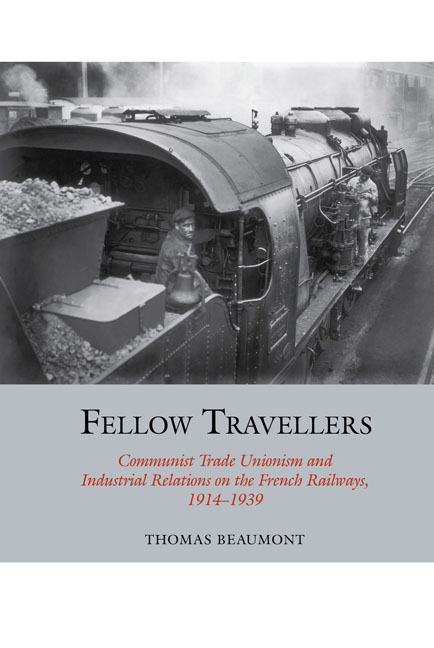 Fellow Travellers
Fellow Travellers Book contents
- Frontmatter
- Contents
- Acknowledgements
- Introduction
- 1 Railway Workers at War
- 2 Railway Workers and the ‘Après Guerre’
- 3 Railway Workers and the Communist Choice
- 4 Stabilisation
- 5 International Connections
- 6 ‘Hostile Participants’: Communists and Railway Industrial
- 7 Railway Workers and the Popular Front: From Victory to Defeat, 1934–1939
- Conclusion
- Bibliography
- Index
Conclusion
- Frontmatter
- Contents
- Acknowledgements
- Introduction
- 1 Railway Workers at War
- 2 Railway Workers and the ‘Après Guerre’
- 3 Railway Workers and the Communist Choice
- 4 Stabilisation
- 5 International Connections
- 6 ‘Hostile Participants’: Communists and Railway Industrial
- 7 Railway Workers and the Popular Front: From Victory to Defeat, 1934–1939
- Conclusion
- Bibliography
- Index
Summary
This book has shed important new light on the interconnected histories of interwar communism and the French labour movement in three key areas. First, it has explored the growth of communist support among one of the PCF's key working-class constituencies, the railway workers. Fellow Travellers is the first book to provide a detailed examination of how and why communist militants were able to put down such deep and long-lasting roots among this significant group of workers during the interwar years. In particular, by placing the emphasis upon the workplace and industrial politics, this work provides one of the few book-length studies of communist trade unionism in France during the interwar period, and sheds important new light on the communist-led CGTU and its relationship with workers and the Communist Party.
Second, this work has sought to place communist activity firmly within the political and social contexts of the railways and railway industrial relations. By exploring the manner in which communist militants sought to respond to the particular challenges and dilemmas posed by the railway context through the 1920s and 1930s, the work has shed important light upon the shifting strategies and approaches adopted by the communistled railway trade union as its leaders and local activists negotiated a path between their communist political convictions and the everyday realities of the railway workplace. In so doing we have seen how communist militants, through their deepening relations with management and state officials, contributed to the shaping of what was to become a particularly French approach to industrial politics during the interwar years, echoing the findings of Herrick Chapman in his early research on France's aircraft workers.
Third, this work has focussed upon the question of power and the place of workers within the late-Third Republic. From the late 1920s onwards, communist militants on the railways placed the extension of working-class representation and the contestation of managerial authority within the railway industry at the heart of their industrial strategy. Defeated, divided, and excluded from positions of influence within the industry after the 1920 strikes, French railway workers, through the activities of communist militants, were increasingly able to exert themselves upon the calculations of railway company management and French state officials. This developing policy of engagement, which I have labelled ‘hostile participation’, was pursued with increasing pragmatism through the years of ‘class-againstclass’, and reached its apotheosis with the advent of the Popular Front.
- Type
- Chapter
- Information
- Fellow TravellersCommunist Trade Unionism and Industrial Relations on the French Railways, 1914–1939, pp. 239 - 246Publisher: Liverpool University PressPrint publication year: 2019
